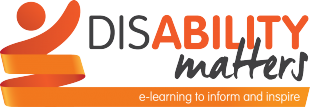 Disability matters. It matters because what we believe about disability and what we believe it means to be disabled directly impacts (for better or worse) on the life experiences of disabled children and young people. The thoughts, fears, ideas and beliefs that we all carry within us inevitably play a powerful role in shaping the way we talk to, work with and support all disabled individuals. This was tragically evidenced by the appalling care provided in Winterbourne View, the care home exposed by Panorama in 2011.
Disability matters. It matters because what we believe about disability and what we believe it means to be disabled directly impacts (for better or worse) on the life experiences of disabled children and young people. The thoughts, fears, ideas and beliefs that we all carry within us inevitably play a powerful role in shaping the way we talk to, work with and support all disabled individuals. This was tragically evidenced by the appalling care provided in Winterbourne View, the care home exposed by Panorama in 2011.
Reports from 2012 and 2013 reveal that disabled young people still regularly encounter a range of physical, communication, information, and coordination barriers when they attempt to access health care services, provide a medical history and description of their symptoms, or try to understand explanations about diagnosis and management. 20 – 30% describe unhelpful or inexperienced staff, while 50 – 70% say that they experience difficulties in making an appointment.[i] Parents of disabled children also report that their children face barriers not only to education, but also to taking part in leisure or play[ii] and nearly 65% of people have admitted they avoid disabled people because they don't know how to act around them.[iii]
As the programme manager of Disability Matters, a free online resource launching 3rd February next year, I believe that these statistics not only can but need to change. To enable health professionals reflect on, challenge and positively change their own fears and beliefs Disability Matters is developing over 30 e-learning topics and activities, interactive exercises, short films and practical tools. All our resources have been co-produced by disabled young people, parent carers and experts across agencies; and give voice to the lived experiences of disabled children, young people and their families. They tell us what works best for them and how we can all do better to support them in their daily lives. They especially remind us that we are all responsible for making that the world we live and work in inclusive; and we all need to adopt attitudes and beliefs that ensure disabled children and young people can enjoy the same opportunities for achievement, fun, independence and decision making as everyone else.
During the 12 months of development I have had the immense pleasure of working with Lynne Watson, a health visitor who passionately believes in the potential for all nurses, health visitors and AHP’s to be a positive force in the lives of disabled children and young people. Lynne’s vision for disabled children and young people is defined by inclusive access and a health service built on caring, compassion and equality. Lynne’s vision is one that Disability Matters hopes to help become a reality, and I offer it to you now:
Nurses, health visitors, school nurses and Allied Health Professionals have important roles to play in ensuring that all children achieve their potential and that education and emotional attainment are not constrained by negative attitudes to disability. They can support parents to overcome the negativity posed by others to having a child with an additional need, working to prevent feelings of isolation and stigma. Although there may be the need for specific help around issues such as sleep or behaviour, the emphasis has to be on function, family, fitness, fun and friends. By encouraging communication in all of the various forms, children and young people can participate in their care through the use of play, drama and art, as well as through the various methods of verbal or non-verbal communications. I believe that by involving children in their own care, respect and partnership is increased which in turn promotes resilience.
Encouraging self- esteem and emotional resilience supports children and young people in surmounting adversity, preparing and empowering them to overcome the challenges of disability which may arise out of ignorance or fear. I feel that a ‘can do’ attitude from health care professionals helps to improve on the poor educational attainment currently experienced by many disabled children. Likewise professionals can support parents to overcome the financial burden of disability encouraging innovative solutions and challenge discriminatory practice. Caring, supportive and responsive professionals recognise the social exclusion which can arise out of negative attitudes, and challenge these constructively. Through the fostering of knowledge and education in our communities of practice, we can all ensure that the needs of disabled children and young people remain at the centre of our work.
Please visit our website www.disabilitymatters.org.uk. Together we can inspire ourselves and those we work with to engage positively with disabled children, respect their choices and proactively support them to live full, meaningful lives.
Disability Matters has been funded by the Department of Health as a direct outcome of the Winterbourne View Report and Review.
Layla Brokenbrow, Programme Manager, Disability Matters, Royal College of Paediatrics and Child Health
[i] Fulfilling Potential: Understanding Disability, Feb 2012
[ii] Fulfilling potential (2013)
[iii] BT - 'Ready, Willing and Disabled Event 2011
